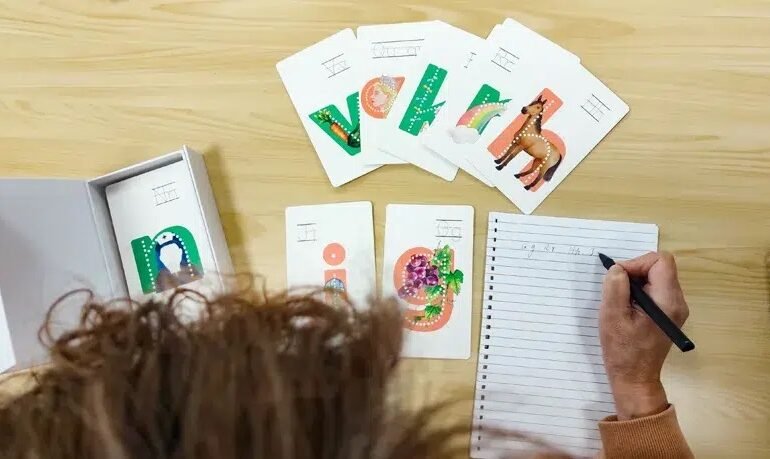How Flashcards Can Unlock Your Academic Potential for Study Success

Flashcards: The Key to Study Success
For students, professionals, and lifelong learners alike, mastering new information efficiently is a common challenge. Flashcards offer a powerful and proven method to enhance memory retention and streamline the learning process. By focusing on active recall and spaced repetition, flashcards allow you to engage with the material in a way that solidifies it in your memory. This makes flashcards not just a useful tool for cramming before exams, but a long-term strategy for academic success.
Why Flashcards Are Effective for Study Success
Flashcards combine two of the most effective study techniques: active recall and spaced repetition. Unlike passive studying methods like reading or highlighting, flashcards force your brain to actively retrieve information, strengthening memory pathways and making it easier to recall facts and concepts in the future. Additionally, by reviewing the material at increasing intervals (spaced repetition), flashcards ensure that knowledge is transferred to long-term memory.
Key Benefits of Using Flashcards
- Improves memory retention: Actively recalling information solidifies it in memory.
- Promotes efficient study habits: Flashcards allow for quick and focused study sessions.
- Customizable: You can create flashcards for any subject or topic, from languages to scientific formulas.
- Portable and convenient: Flashcards can be used anywhere, whether in paper form or digitally on a mobile app.
How Flashcards Use Active Recall to Boost Learning
Active recall is the process of forcing your brain to retrieve information from memory rather than passively absorbing it. When you look at a flashcard prompt and try to recall the answer, you engage in this process, strengthening the connection between the question and the answer in your mind. This makes it much easier to retrieve the same information when you need it, such as during an exam or a presentation.
Additionally, because flashcards are often reviewed quickly and in short bursts, this method prevents the cognitive overload that can come from prolonged study sessions. Short, active recall sessions allow the brain to focus on retaining one piece of information at a time.
The Role of Spaced Repetition in Study Success
One of the reasons flashcards are so effective is their ability to integrate spaced repetition into your study routine. Spaced repetition is the practice of reviewing information at gradually increasing intervals, which helps reinforce the material in your long-term memory. The idea is to review challenging concepts more frequently, while concepts you already know are reviewed less often. This helps ensure that you are constantly refreshing your memory of difficult material without wasting time on information you’ve already mastered.
How Spaced Repetition Works
- Immediate Review: Start by reviewing new flashcards as soon as you learn the material.
- First Interval: Review the flashcards again after a short interval (such as a few hours or a day).
- Increasing Intervals: Gradually increase the time between reviews based on how well you recall the information. Cards you struggle with will be reviewed more frequently, while those you easily remember will be spaced out further.
Traditional Flashcards vs. Digital Flashcards
Both traditional paper flashcards and digital flashcards offer unique advantages depending on your study preferences. Here’s a breakdown of the differences to help you decide which option works best for you.
Traditional Paper Flashcards
Paper flashcards are easy to create and use. Writing out the cards by hand can even enhance memory retention since the process of handwriting helps solidify the material in your mind. These flashcards are lightweight, portable, and can be customized with your own designs, colors, or notes. However, managing large sets of paper cards can be cumbersome, and it’s challenging to incorporate spaced repetition without manually tracking review intervals.
Digital Flashcards
Digital flashcards, on the other hand, offer increased functionality and convenience. Apps like Quizlet, Brainscape, and Anki allow users to create and organize flashcards, integrate multimedia elements, and track progress. One of the biggest advantages of digital flashcards is the use of spaced repetition algorithms, which automatically adjust the review schedule based on how well you know each concept. This ensures efficient study sessions with minimal time wasted on material you’ve already mastered.
How to Create Effective Flashcards for Study Success
Creating well-designed flashcards is essential to maximizing your study efficiency. Here are some tips to ensure that your flashcards are effective and help you retain the information you need to succeed:
1. Keep Each Card Simple
Each flashcard should focus on a single question, fact, or concept. Overloading a card with too much information can make it difficult to recall the specific answer during review. Stick to bite-sized pieces of information to make the learning process more manageable.
2. Use Clear and Direct Questions
Avoid vague questions on your flashcards. Each card should present a clear question or prompt that leads directly to a concise answer. This clarity makes the recall process faster and more effective.
3. Incorporate Images and Visuals
Visual learners may benefit from adding diagrams, images, or even color-coding to their flashcards. Visual aids help reinforce the material and make abstract concepts easier to remember.
4. Use Active Recall Prompts
Instead of simply writing out definitions or facts, use prompts that encourage active recall. For example, instead of writing “Photosynthesis is the process by which plants convert sunlight into energy,” try writing the question “What is the process by which plants convert sunlight into energy?” This forces you to actively engage with the material.
Leveraging the Anki Mobile App for Study Success
One of the most powerful digital tools available for flashcard-based study is the Anki mobile app download. Anki uses spaced repetition algorithms to help users optimize their study sessions by reviewing difficult material more frequently and spacing out reviews of information they already know. This personalized approach makes studying more efficient and improves long-term retention.
Anki also allows users to create custom decks for virtually any subject, integrate multimedia such as images and audio, and track their progress over time. Its mobile app makes it easy to study on the go, whether you’re commuting, waiting in line, or relaxing at home. With Anki, you can sync your flashcards across devices, ensuring that your study progress is always up to date.
How to Study Effectively with Flashcards
Using flashcards effectively involves more than just flipping through them repeatedly. To maximize your study time, incorporate these strategies into your flashcard sessions:
1. Start Early and Review Often
The key to study success with flashcards is consistency. Start studying early, even before you feel the pressure of an exam, and review your flashcards regularly. Frequent review ensures that the material stays fresh in your mind and prevents last-minute cramming.
2. Shuffle the Deck
Shuffling your flashcards during study sessions ensures that you’re not relying on the order of the cards to recall information. By randomizing the order, you challenge your brain to recall the information independently, which strengthens memory retention.
3. Use Timed Sessions
Set aside short, focused blocks of time to review your flashcards. Use timers to create study sessions of 20-30 minutes, followed by short breaks. This technique keeps your brain focused and prevents burnout during longer study periods.
Conclusion
Flashcards have proven to be one of the most effective tools for achieving study success. By combining active recall and spaced repetition, flashcards offer a structured yet flexible method for mastering new information. Whether you prefer traditional paper flashcards or digital options like the Anki mobile app download, the key to success lies in consistent, focused study sessions. With the right strategies and tools, flashcards can help you retain information more effectively and reach your academic goals faster.
Also read more: Maximize Your Learning: Effective Study with Flashcards and Anki.












